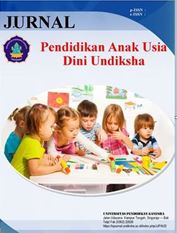MODEL PEMBELAJARAN QUANTUM MELALUI PERMAINAN TRADISIONAL UNTUK MENINGKATKAN KOGNITIF ANAK KELOMPOK B TK KUMARA JAYA DENPASAR
DOI:
https://doi.org/10.23887/paud.v2i1.3713Abstract
Penelitian ini bertujuan untuk meningkatkan kemampuan kognitif anak dengan menerapkan model pembelajaran Quantum melalui permainan tradisional di kelompok B TK Kumara Jaya Denpasar pada semester genap tahun pelajaran 2013/2014 Jenis penelitian ini adalah penelitian tindakan kelas yang dilaksanakan dalam dua siklus. Subjek penelitian berjumlah 17 anak TK Kumara Jaya Denpasar kelompok B semester II tahun pelajaran 2013/2014. Data penelitian tentang kemampuan kognitif dikumpulkan dengan metode observasi menggunakan instrumen berupa format lembar observasi. Data hasil penelitian dianalisis dengan menggunakan metode analisis statistik deskriptif dan analisis deskriptif kuantitatif. Hasil analisis data menunjukkan peningkatan kognitif anak kelompok B1 di TK Kumara Jaya Denpasar pada semester II tahun pelajaran 2013/2014 setelah diterapkan model pembelajaran Quantum menggunakan permainan tradisional. Ini dibuktikan dengan hasil pada siklus I sebesar 57,70% pada kategori rendah, ternyata meningkat menjadi 94,03% pada siklus II dengan kategori sangat tinggi. Dengan demikian, dapat disimpulkan bahwa terjadi peningkatan presentase kognitif anak sebesar 36,33 % dengan menerapkan model pembelajaran Quantum pada anak kelompok B semester II TK Kumara Jaya Denpasar.Kata Kunci : model pembelajaran Quantum, permainan tradisional, kognitif.
This research aims to increase cognitive abilities of children in the group B of TK Kumara Jaya Denpasar by implementating Quantum teaching through traditional game in group B of TK Kumara Jaya Denpasar, on second half period, academic year 2013/2014. This research is an action research or classroom action research that implemented in two cycles. Subjects in this research were 17 children in B1 group of TK Kumara Jaya Denpasar, on academic year 2013/2014. Data of cognitive abilities collected using observation methods, by an instrument called observation sheet. The collected atas were being analyzed by using descriptive statistical analysis quantitative. Data analyzing were done by comparing the results of the first cycle and second cycle. The result of data analyzing shows that there is an increasement of cognitive abilities of B1 group children in second half period on academic years 2013/2014 after implementating Quantum learning by using traditional games. In the first cycle, the result of cognitive ability is at 57,70% on very low category. While in the second cycle, the result of cognitive abilities is at 94,03% onvery high category. It can be concluded that there is an increasement of cognitive abilities about 36,33% by applying Quantum learning by using traditional games to the B group children in second half periodof TK Kumara Jaya Denpasar.
keyword : Quantum learning, traditional games, cognitive
Published
2014-08-04
How to Cite
., N. L. A. C., ., D. M. R. K., & ., D. I. B. S. M. M. (2014). MODEL PEMBELAJARAN QUANTUM MELALUI PERMAINAN TRADISIONAL UNTUK MENINGKATKAN KOGNITIF ANAK KELOMPOK B TK KUMARA JAYA DENPASAR . Jurnal Pendidikan Anak Usia Dini Undiksha, 2(1). https://doi.org/10.23887/paud.v2i1.3713
Issue
Section
Articles
License
Authors who publish with the Jurnal Pendidikan Anak Usia Dini Undiksha agree to the following terms:
- Authors retain copyright and grant the journal the right of first publication with the work simultaneously licensed under a Creative Commons Attribution License (CC BY-SA 4.0) that allows others to share the work with an acknowledgment of the work's authorship and initial publication in this journal.
- Authors are able to enter into separate, additional contractual arrangements for the non-exclusive distribution of the journal's published version of the work (e.g., post it to an institutional repository or publish it in a book), with an acknowledgment of its initial publication in this journal.
- Authors are permitted and encouraged to post their work online (e.g., in institutional repositories or on their website) prior to and during the submission process, as it can lead to productive exchanges, as well as earlier and greater citation of published work. (See The Effect of Open Access)












